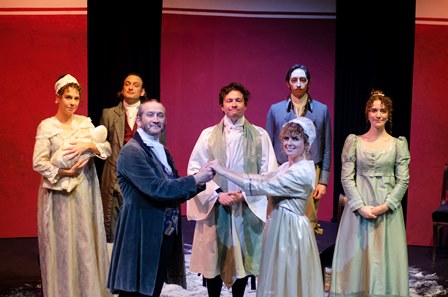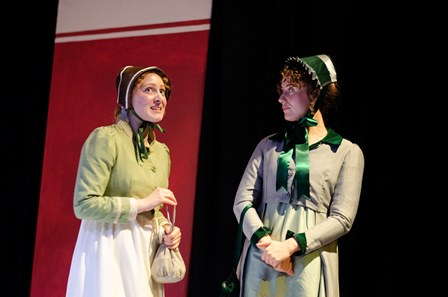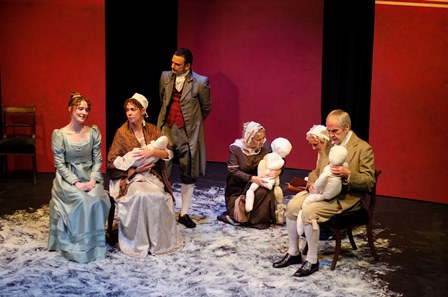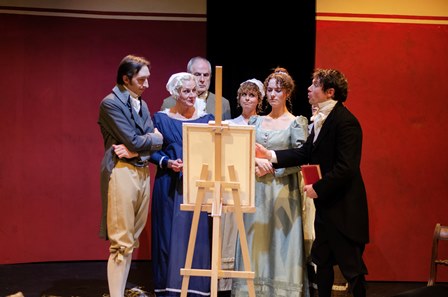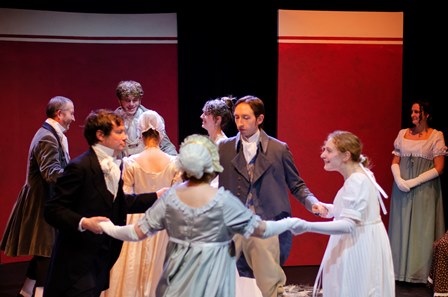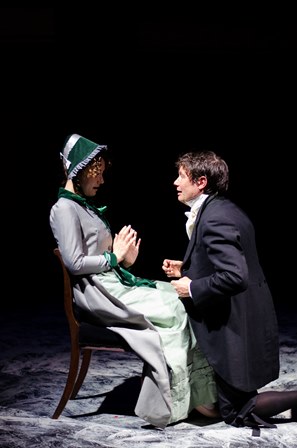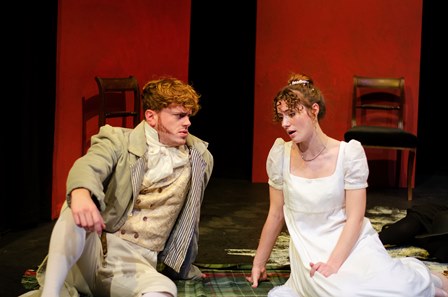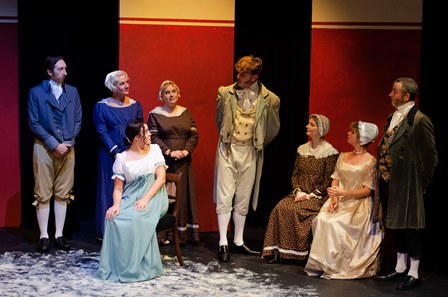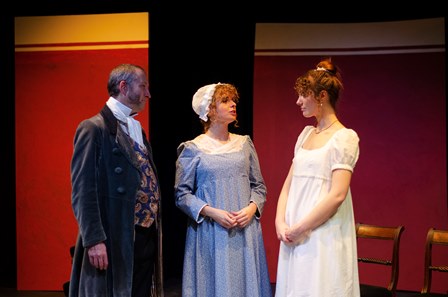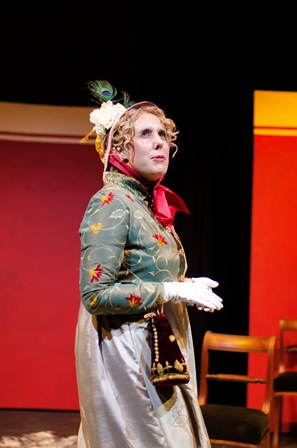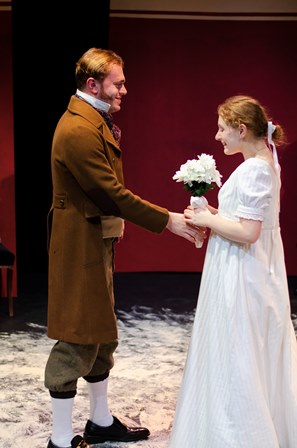The Bench Production
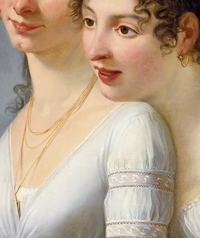
This play will be staged at The Spring Arts and Heritage Centre (formerly Havant Arts Centre), East Street Havant - Bench Theatre's home since 1977.
Cast
| Narrator 1 | Laura Sheppard |
| Narrator 2 | Angie McKeown |
| Mr Henry Woodhouse | Roger Wallsgrove |
| Emma Woodhouse | Alex Eels |
| Isabella Knightley | Leila Morello |
| John Knightley | Scott Jowett |
| George Knightley | James Andrews |
| Anne Weston | Beth Evans |
| Mr Weston | Roger Niven |
| Mrs Goddward | Christine Allison |
| Miss Bates | Robin Hall |
| Mr Elton | Jeff Bone |
| Harriet Smith | Natasha Ryszka-Onions |
| Robert Martin | Archie McKeown |
| Frank Churchill | Archie Mckeown |
| Jane Fairfax | Kerrie Thirlwell |
| Augusta Elton | Bernadette Lomas |
Crew
| Director and Producer | David Penrose |
| Stage Manager | Jacquie Penrose |
| Lighting Design | Mike Jones |
| Sound Design | Howard Alston |
| Lighting Operation | Mike Jones |
| Sound Operation | Paul Millington |
| Set Design | David Penrose |
| Costumes | Di Wallsgrove |
| Flyer Design | Dan Finch |
| Programme Editor | Derek Callam |
| Photography | Elly Willats |
| Front of House | Ingrid Corrigan |
Director and Adaptor Notes (or "The Perils of Staging a Classic!")
"Oh, 'Emma'! It’s my favourite book." I've heard that lots. Then my heart sinks a bit. Because they might come and see it – a good thing; and it's not what they'd imagined at all – a bad thing.
Of course, beyond the book itself, Austen fans have had many encounters with Emma Woodhouse. Gwyneth Paltrow, Kate Beckinsale, Romola Garai and Anya Taylor-Joy have all played her on film or television. And none of those showcases have ever told the story in quite the same way. So in making my adaptation, I gave myself two guiding principles. It had to make Miss Woodhouse both loveable and infuriating in equal measure, and it had to be funny.
I hope I haven't lost you already.
The first job was to decide what to leave out. There is a huge amount of back-story in 'Emma', twenty year-old events that shape the present; and many scenes that expand on the principal events of the book to make a three volume novel. Some of it had to go. If your favourite character is Miss Bates's aged mother, or you are looking forward to being reunited with Emma's neighbours, the Coles, you are in for a disappointing evening. They are not in it. So the musical evening to hear Jane Fairfax play and Frank Churchill sing is not at the Coles' house, it's at the Woodhouse residence. But all the milestone scenes are there, perhaps most iconically, the Box Hill picnic.
What can't be left out? For me, it is Jane Austen herself. Her observations about her characters, that none of them could make themselves, have to be heard. So I employ two narrators to represent her authorial voice without trying to turn it all into dialogue. Nobody is going to say "Emma Woodhouse, handsome, clever, and rich, had lived nearly twenty-one years in the world with very little to distress or vex her". But someone has to. It's a famous first line! Or most of it. Yes, I did leave out the middle bit. But we've only got a couple of hours.
Adapting 'Emma' was the perfect 2020 lockdown project. I'm not sure if I would ever have done it without being under house arrest. I did it for another director too. It has been twenty years since I last directed a play – more back-story. Only in the intervening months did I realise that if I was ever going to direct a show again, it had to be this one. And I'm glad I did. I am full of admiration for the cast and their enthusiasm for the project.
That had to include the dancing. Two left feet is almost an entry requirement for the Bench – okay, mostly for the men. Jane Austen cannot resist a ball, though. So it had to be done. I am indebted to The Duke of Wellington's Dancers for teaching us to dance the Regency way and to their house band, Green Ginger, for especially recording the dance pieces for us.
At the end of the day, 'Emma' is a great book for all that our expectations of a dramatised version may differ. As Ms. Austen wrote, for Emma to say, "That is the case with us all, papa. One half of the world cannot understand the pleasures of the other."
David Penrose
Reviews
The NewsJames George
BENCH Theatre are back at The Spring doing what, arguably, they do best – creating and producing work of their own.
Okay, this time David Penrose has had a little help from Jane Austen, but his adaptation of her Emma owes as much to him as to the author. Simply set – a stage bare of practically everything bar four chairs – Penrose's focus is on story and language, not the look of the thing. That said, the costumes are beautiful.
Austen's language does not sit comfortably in the mouths of some of the actors – her phrasing is convoluted – and words have meanings that have subtly shifted in the 200 years since the novel was written, causing the odd strange inflection.
James Andrews takes George Knightley's blandness and makes a virtue of it turning it into a repression that works nicely for the character. In contrast, Archie McKeown's Regency party-animal, Frank Churchill, is a joy and his vocals are shiveringly good. Eels' Emma – the character, not the performance – is unlikeable in the first act; I had difficulty connecting with her. This changes in the second act when Emma appears more rounded and Eels is able to open up the more genuine aspects of the character. It's a mammoth part, she's rarely off-stage, and she wears it well.
There's excellent work from Natasha Ryszka-Onions as the naive Harriet Smith, a part wildly open to caricature rather than characterisation, who keeps well on the right side of those two choices. And then there's Bernadette Lomas as the vicar's wife, Augusta Elton. Does she overplay it? Yes, she does. Does that matter? In this instance, it doesn't. It's joyous, over-the-top, well-observed and very funny. She's worth your ticket money on her own.
And most impressive of all? There's a scene where the main characters sit in the sun, enjoying the heat, enjoying the stillness. For the majority of the scene, only two people talk. The cast show here how doing nothing is often the best choice an actor can make. You can feel the thick heat of summer as they lie there doing nothing, saying nothing, just being.
Perhaps some trimming to the text would make for a slicker piece, particularly the first act, but that's just being picky. Good stuff.
Production Photographs
